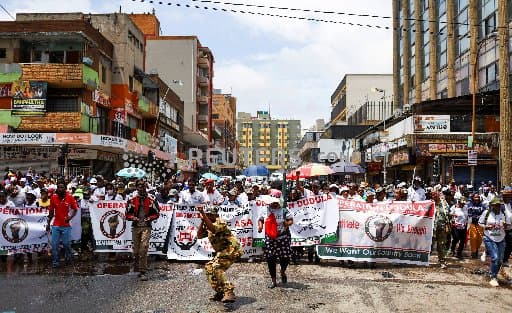CAPE TOWN, South Africa — South African church leaders urged government action after a Zimbabwean migrant was killed in a mob attack in a Johannesburg township rocked by violent anti-crime protests.
Elvis Nyathi, a 43-year-old Zimbabwean, “was hunted down like a frightened animal, butchered and reportedly burned to death” April 6 in Diepsloot, said the South African Council of Churches.
“The perpetrators of this xenophobic violence must be brought to book without delay so that justice is done and seen to be done,” Father Hugh O’Connor, general secretary of the Southern African Catholic Bishops’ Conference, told Catholic News Service April 13.
The South African authorities “must do more to protect migrants” in Diepsloot, who have “repeatedly suffered from violent attacks by anti-migrant vigilante groups,” Amnesty International said in an April 13 statement. In the first week of April, seven people died in xenophobic violence in the northern Johannesburg township.
In recent months, scores of protesters in Johannesburg have staged protests against undocumented migrants in what they have dubbed Operation Dudula (“drive back” in Zulu).
In its April 6 statement, the council of churches, of which the bishops’ conference is a member, noted its despair at the violence.
“We … hang our heads in collective shame that things have come to this,” the church leaders said, noting that they “warned that this growing tendency of community groups going on search parties to ‘smell out’ who they consider illegal foreigners will lead to deaths.”
Migrants in Diepsloot said they live in fear and are being made scapegoats for rising levels of crime and unemployment in the area, Amnesty International said. The migrants “feel unsafe in South Africa and face constant harassment from both the police and anti-migrant vigilante groups, who unlawfully demand to see their identity documents,” it said.
“These attacks represent just the latest wave in a rising tide of violence against migrants in South Africa,” Amnesty International said, noting “a lack of political will within government to address the problem.”
Nationwide attacks against African migrants in May 2008 left at least 62 people dead.
“Since then, attacks against migrants have occurred every year” in South Africa, Amnesty International said, noting that it has “repeatedly called for a national strategy to prevent violence against migrants and an end to the impunity enjoyed by the perpetrators of these fatal assaults.”
The bishops’ conference “condemns all anti-foreigner sentiment, recognizing that it often leads to violence and the destructions of lives,” O’Connor said.
“The protection and integration of migrants and refugees into a society is the work of all, from government to business, the religious sector and to ordinary citizens,” he said.
The council of churches named African migrants who have been stabbed or burned to death and asked, “Is the identity of ‘street killers of Africans’ the brand we choose to project for South Africa?”
“Whatever grievances or opinions anyone may have about non-South Africans of whatever category in our society and economy, there is a way to address those in a structured manner that does not involve mob lynching resulting in death,” it said.
After gathering people’s opinions and proposed solutions through email, the council will join discussions with “organized societal bodies and with government ahead of a full plenary of the National Indaba on Non-South Africans in our Society and Economy,” it said.













